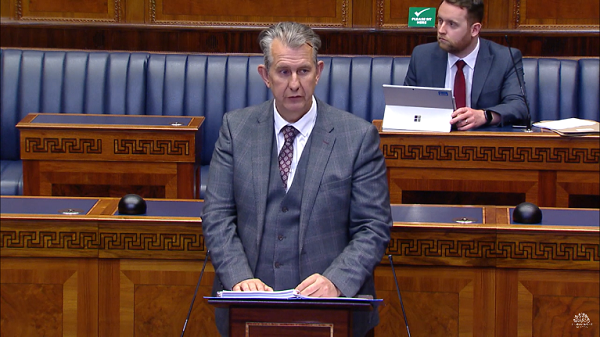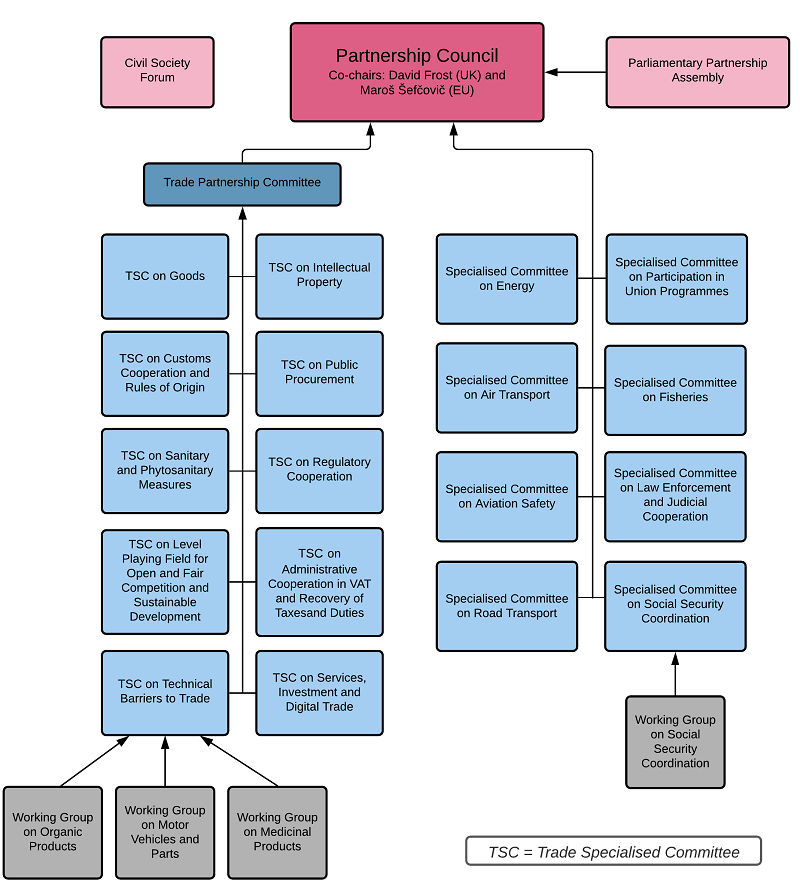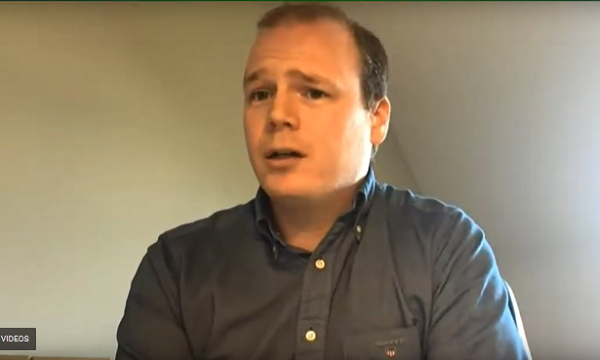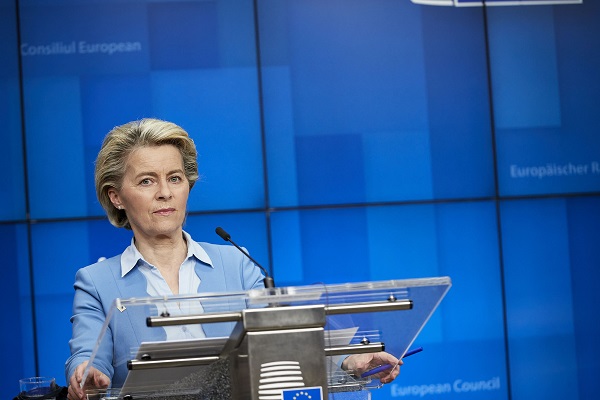Brexit & Beyond Newsletter
1 June 2021

Welcome to the 1 June 2021 newsletter
Technical discussions between the EU and UK on the implementation of the Protocol on Ireland/Northern Ireland continue, with varying assessments of how much progress is being made. NI Agriculture Minister Edwin Poots took questions from MLAs in the Assembly, while Lord Frost responded to questions in the House of Lords. The Committee for the Executive Office heard evidence from junior Ministers, while Commons and Lords Committees heard from community and civic society representatives.
Implementation of the Protocol
Amid reports of souring relations between the EU and UK, NI Minister for Agriculture, Environment and Rural Affairs, and newly elected DUP leader Edwin Poots and Vice-President of the European Commission Maroš Šefčovič spoke to the BBC’s Andrew Marr on Sunday. Poots argued that Northern Ireland is being “used as a plaything for the European Union”. Šefčovič said that the EU-UK relationship needs more joint cooperation. He said 80% of checks could be removed with a veterinary agreement, and this could even be on a temporary basis: “it would calm down the situation, it would help all sides to build necessary infrastructure and address the issues raised by the stakeholders”. He said the EU was ready to do such an agreement – “we need to get over ideology into pragmatism and real politics.”
Meanwhile RTÉ reports that discussions between the EU and UK on the Protocol’s implementation are making progress. There are over 25 areas of contention, including medicines, VAT, and movement of plants and pets. According to RTÉ, the European Commission is close to finding a solution to the medicines issue, but there has been less progress on food safety and animal health in relation to GB-NI supermarket supplies.
The NI Assembly Research and Information Service has published a useful blog on Northern Ireland’s trading arrangements for goods.
Question Time in the Assembly
During Question Time in the Northern Ireland Assembly on Tuesday, Minister of Agriculture Edwin Poots was asked to confirm that he would not obstruct any further North/South meetings. Poots stated that he remains “committed to all my duties as a Minister in this devolved Assembly.” He went on to say that, “Relations between Northern Ireland and the Republic of Ireland are very bad, and they need to be fixed. In order to fix those relations, however, we need reassurances that we will get somewhere considerably better than where we are currently with the protocol.”

Edwin Poots speaking in the Assembly on Tuesday | Source: NI Assembly
Poots was also asked about the costs for his department associated with the Protocol on Ireland/Northern Ireland. He told the Assembly the costs since June 2020 for vets, including managers, is £5,271,696; for other ancillary staff provided by DAERA the cost is £6,324,902; while for environmental health officers and ancillary staff provided by the councils the cost is £12,848,034. This totals £24,444,632 and Poots went on to say that, “when the grace period ends, those costs will spiral considerably, because we will move to what the Department suggests will be some 15,000 checks per week, which is considerably greater than what we do currently.”
In the Assembly the matter of the shortfall in funding as a result of Brexit was also raised in the debate on the Budget 2021-22, including for direct farm payments, and the shortfall in EU replacement funding for Northern Ireland in the Shared Prosperity Fund and Community Renewal Fund.
Lord Frost questioned on the Protocol
Lord Frost, Minister of State at the Cabinet Office who is responsible for oversight of the implementation of the Protocol on Ireland/Northern Ireland was asked in the House of Lords on Thursday by Lords Dodds (DUP) what steps the Government will take to “prevent any negative impact on Northern Ireland from the Protocol on Ireland/Northern Ireland”. Frost said, “We remain committed to working through the issues with the EU, and we hope that it will show common sense and take a pragmatic risk-based approach to the problems. We continue to consider all our options in meeting our responsibility.” Frost went on point out to Dodds that “the protocol itself is clear that it is without prejudice and has no effect on the territorial integrity of the UK or its essential state functions,” but said they “understand the dismay and concern about identity that is provoked by the way the protocol is currently being implemented”.
Frost was also asked about meeting of UK-EU Trade and Cooperation Agreement (TCA) bodies: he stated that they expect most bodies to meet before the summer break and that the Partnership Council is likely to meet in the first half of June. Lists of chairs of the committees have been exchanged with the EU. He said the Joint Committee, which oversees the implementation of the Withdrawal Agreement, including the Protocol, should also meet around the same time. Frost also said that they are in touch with the EU about the TCA civil society forum, and are working to facilitate the first meeting this year.

EU-UK Trade and Cooperation Agreement governance structures
Frost has written to the First Minister Arlene Foster, deputy First Minister Michelle O’Neill, and the Scottish and Welsh Governments in relation to how the devolved administrations will be involved in the Trade and Cooperation Agreement bodies. He writes that where items of devolved competence are on the agenda of the Partnership Council or Specialised Committee, they “expect to facilitate attendance by Devolved Administrations” and that officials in the Cabinet Office should “regularly discuss strategic and cross-cutting EU issues” with devolved officials. Frost also asks for devolved administrations to keep the Government informed about contact the devolved Ministers or senior officials have with the EU institutions or member states, writing, “we would of course expect that you would support the UK Government’s position in such contacts”.
Junior Ministers at the Executive Office Committee
On Wednesday the Committee for the Executive Office heard from junior Ministers in the Executive Office Declan Kearney (Sinn Féin) and Gordon Lyons (DUP). Lyons said they are keeping the EU’s legal challenge against the UK under review. He stated that the Joint Consultative Working Group has started to meet monthly, with a third meeting held on 12 May. This focused on operational issues, in particular, the “mechanics of exchanging information” between the EU and UK. The Executive Office was represented by an official and processes are being put in place for the Executive Office to then disseminate the information received. Lyons emphasised that it is important that Northern Ireland Executive is included in the Trade and Cooperation Agreement governance structures and said they continue to engage with the UK Government on this. Work is ongoing to develop a system to track and monitor legislation contained in the Protocol.

Junior Minister Gordon Lyons speaking to the Committee | Source: NI Assembly
Lyons noted that the deadline for the EU settlement scheme is approaching (30 June 2021): a local campaign is running to raise awareness of the scheme, and to show the contribution that EU citizens make to life here. On Sunday, the UK Home Office published statistics on the EU Settlement Scheme up to March 2021. By this date, a total of 5,301,470 applications to the scheme had been received. Most applications were received from England (4,501,460), with 80,190 from Northern Ireland.
Chair of the Committee Colin McGrath asked what the Executive Office is doing to amplify the positives economic benefits of the Protocol. Lyons said their focus has been on limiting negative impacts and should be on sorting out the problems. Kearney said there is a “division of opinion” in the Executive Office on this matter. He said his focus was on engaging with local businesses to ensure they have the information they need and said there should be increased engagement by the European Commission and UK with society in NI.
On Common Frameworks, Lyons said his understanding is that progress has been made. However, there are a few issues within the Department of Agriculture, Environment and Rural Affairs which require further clarity. He hopes to send an update to the Committee soon. Lyons said the frameworks are “extremely technical” with the “potential to have huge implications for Northern Ireland if there is divergence with the rest of the UK”.
The Committee also heard from the Special EU Programmes Body (SEUPB). The SEUPB is responsible for the implementation of the EU’s PEACE programmes. Gina McIntyre, CEO of the organisation said they had strong interest in their consultation on the PEACE PLUS programme: there were 415 respondents to their survey, 3/4 of these from organisations. The consultation found overwhelming support for the programme as it was drafted, which has six themes and 21 investment areas. The finalisation of the programme will now take place, which will then be submitted to the European Commission in July.
Post-Brexit intergovernmental cooperation on health
On Tuesday, the Lords Common Frameworks Scrutiny Committee heard from health experts on post-Brexit intergovernmental cooperation on health. The experts were asked about how Northern Ireland’s reliance on organ and blood supplies from Great Britain may be affected if there is regulatory divergence as a result of the Protocol on Ireland/Northern Ireland. Mark Dayan of Nuttfield Trust told the Committee that the core principles remain the same between NI and GB, however even with no substantive divergence, there are additional barriers to circulating organs, in the form of bureaucracy and extra paperwork e.g. import licences and supply contracts. Organs and blood are effectively being imported into the EU single market from the UK. If the UK were to diverge from the core principles, it could become much harder to bring blood to NI from GB. Ian Rees of the MHRA said that while there are administrative challenges, there is also an opportunity to create a mutual recognition agreement to facilitate the swift movement of tissues, blood and cells, should there be legislative differences.
NI Affairs Committee inquiry on the Protocol
On Wednesday, the Northern Ireland Affairs Committee heard from John Kyle, Councillor at Belfast City Council. Kyle expressed support for an SPS agreement between the EU and the UK and pointed out that all five countries in the UK and Ireland have a vested interest in securing high food safety and animal welfare standards. While acknowledging that there are positive economic possibilities from the Protocol, Kyle said, "For many unionists, being British is more important than being prosperous”.
Peter Sheridan, CEO of Co-operation Northern Ireland also spoke to the Committee. He pointed out that there is no representation of Northern Ireland in the EU where decisions are being made. He suggested that if the parts of the Protocol which are causing the most adverse impact could be removed, then there may not be the same tension. He said there should be a rebuilding of trust between the EU and UK and that those with responsibility for the Protocol can work to reduce tensions by resolving the difficulties.
Protocol Sub-Committee hears from community and civic society representatives
The House of Lords Sub-Committee on the Protocol also heard evidence from Peter Sheridan, along with Jackie Redpath, CEO at Greater Shankill Partnership, and Mary Madden, former Northern Ireland Office senior official. Redpath told the Committee, "That is the most serious implication for me of what's happening with the Protocol at the moment - in terms of the peace process, in terms of attitudes to devolution which now are much more negative and towards the Belfast/Good Friday Agreement."
Madden said she thinks it is “imperative” that some of the mitigations for the Protocol, which have been talked about, come into play. Especially with the end of the grace periods looming, she said there has to be “demonstrative evidence” that some of these difficulties which the individual consumer is experiencing will be resolved.
Sheridan said what is causing some of the tensions is the “visibility of that border down the Irish Sea”. He said there should be a common approach to food safety and veterinary standards, which the UK already upholds. Madden said she was somewhat concerned about the EU’s position which seems to be focused on “rules and rules and rules”. She contended that, “I don’t think they quite understand the tension between identity and the trading agreements they have reached.” She expressed concerns about the sustainability of the Protocol in its current form.
European Council conclusions on the UK
The UK was on agenda for the European Council on 24-25 May. The Council agreed that the Commission should “continue its efforts to ensure full implementation of the Agreements [with the UK], including in the areas of EU citizens’ rights, fisheries and level playing field, making full use of the instruments under the Agreements.” The Council “will remain seized of the matter and the EU will continue to be united in its engagement with the UK”.

European Commission President Ursula von der Leyen speaking to the press following the European Council summit | Source: European Union
Following the meeting, President of the European Commission Ursula Von der Leyen told the press that, “the Protocol is the only possible solution to ensure peace and stability in Northern Ireland, while protecting the integrity of the European Union Single Market…If we see problems today, we should not forget that they do not come from the Protocol, but they result from Brexit – that is the reason why the problems are there.” (Source: @tconnellyRTE on Twitter)
This Week at the Assembly
- Tuesday 1 June, 2pm – Plenary - Question Time – The Executive Office
- Wednesday 2 June, 2.35pm - Committee on Procedures - House of Commons Procedure Committee Inquiry - Briefing by RaISe
- Thursday 3 June, 9.35am – Committee for Agriculture, Environment and Rural Affairs - Oral Evidence from DAERA Minister Poots - Withdrawal of DAERA and Local Authority staff from ports
Catch up with the Committees
- Tuesday 25 May, 2pm –Plenary - Question Time – Agriculture, Environment and Rural Affairs
- Wednesday 26 May, 2pm - Committee for the Executive Office - UK Exit from European Union - Oral evidence session with Junior Ministers; Special EU Programmes Body - Oral evidence on EU programmes
- Thursday 27 May, 10am – Committee for Agriculture, Environment and Rural Affairs - Written Briefing DAERA - EU Transition Update



